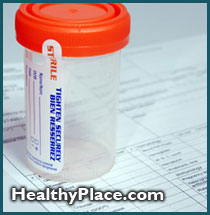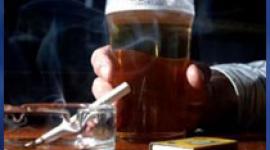Employee Drug Testing
Detailed info on employee drug testing - how long drugs stay in your system, types of drug tests, false-positives on a drug test.
 As a condition of employment, many people have to submit to pre-employment drug screening or random drug testing once they're on the job.
As a condition of employment, many people have to submit to pre-employment drug screening or random drug testing once they're on the job.
The pre-employment check that many fear most is the pre-employment drug screening--and rightly so. A strong note of caution: if you have in the past or are presently using illegal drugs, you are strongly advised to stop using them--immediately! The day before--or even the week before—the drug test will likely be too late to achieve "clean" results. But if you make a commitment to steer clear far enough in advance, you may give your body enough time to detoxify and flush out. While many substances can clear in under a week, there are some that will stay with you much longer. For instance, some marijuana users can quit 31 days in advance and still fail the drug test.
How long do drugs stay in your system?
There is no simple answer as to how long drugs will remain in your system, since the answer is influenced by the specific drug half-life, intensity of the usage, method of usage, length of usage, tolerance, fluid intake, body size, body fat, metabolism and (most important) the specific range which the drug testing lab uses to signify a "positive" for drug use. But the following table provides some general guidelines for the amount of time a drug can be detected by most standard drug tests:
- Alcohol 6-24 hours
- Amphetamines 2-3 days
- Barbituates 1 day to 3 weeks
- Benzodiazepines 3-7 days
- Cocaine 2-5 days
- Codeine 3-5 days
- Euphorics (MDMA, Ecstasy) 1-3 days
- LSD 1-4 days
- Marijuana (THC) 7-30 days
- Methadone 3-5 days
- Methaqualone 14 days
- Opiates 1-4 days
- Phencyclidine (PCP) 2-4 days
- Steroids (anabolic) 14-30 days
Keep in mind that detection time listed above does not mean that the drug is fully expelled from your body within that amount of time just that it has dissipated enough that it can no longer be accurately detected--or at least is not high enough to register a "positive" on a drug test. Most drugs are treated by the body as toxins which take time to eliminate. Rather than allow the toxins to potentially affect vital organs, they are often stored in fat cells, making them typically difficult to release or detoxify from the body.
Types of drug tests
The basic drug test used by most corporate drug testing programs is called a "Five-Screen" (or "NIDA-5" or "SAMHSA-5") which is testing for five types of drugs:
1. Cannabinoids (Marijuana, Hashish)
2. Cocaine (Cocaine, Crack Cocaine, Benzoylecognine)
3. Opiates (Heroin, Opium, Codeine, Morphine)
4. Amphetamines (Amphetamines, Methamphetamines, Speed)
5. Phencyclidine (PCP, Angel Dust)
Many drug testing firms now offer a "Ten-Screen" which expands to include five additional drugs:
1. Barbituates (Phenobarbital, Secobarbitol, Pentobarbital, Butalbital, Amobarbital)
2. Methaqualone (Qualuudes)
3. Benzodiazepines (Tranquilizers--, , Librium, Ativan, Xanax, Clonopin, Serax, Halcion, Rohypnol)
4. Methadone Propoxyphene (Darvon compounds)
Other drugs that can be included in drug tests include:
- Ethanol (alcohol)
- LSD Hallucinogens (Psilocybin, Mescaline, MDMA, MDA, MDE)
- Inhalents (Toluene, Xylene, Benzene)
A good general rule of thumb: if there is a drug out there, there is a drug test for it.
Second-hand exposure
How about one more thing to worry about? Second-hand smoke from marijuana and crack cocaine can be absorbed into your hair. Problem? Some companies are now using hair testing to determine drug usage. Answer? Don't even hang around others who are doing drugs. It can still be absorbed into your system and produce a positive test result. "I didn't inhale..." is not a valid response. And sufficient second-hand smoke exposure can also cause failure of standard urine drug tests. You could fail both a primary and secondary test, with no recourse other than saying that it was someone else.
If you are not a drug user and you fail the drug screening (it does happen), be as straightforward with the employer as possible, let them know that you are not a drug user and ask them if they would please do a confirmation test. Recent estimates from the Journal of Analytic Toxicology showed error rates of 5 to 14% on this initial test. Following is a list of over-the-counter medications which have been known to cause false positives in drug testing:
Ibuprofen (Advil, Motrin) Midol Nuprin Sudafed Vicks Nasal Spray Neosynephren Ephedra and Ephedrine-based products (often used in diet products) Detromethorphan Vicks 44.
False-positives on a drug test
There are more, but suffice to say that not every drug test is accurate. That's why almost all drug testing companies ask you in advance what medications you are presently taking or have taken in the last 30 days. Make sure you list them all, even over-the-counter medications. Most reputable drug testing companies will either have a doctor (or other medical professional) personally interview those who fail a drug test to determine if there was a potential false positive.
If you do receive a failing grade (actually referred to as a "positive" on your drug test--this is one test you do NOT want a positive--you want all negatives) on your drug test, ask to be retested with a confirmation or secondary test. Most employers do not automatically perform the confirmation test since it is significantly more expensive than the initial test. However, if they are unwilling to offer retesting due to the expense, offer to pay the expense on your own and then use a different testing service--ideally a secondary testing provider recommended by the employer so that you won't have a credibility problem with the second test. If you are turned down in your request or you have additional problems, you may want to seek the advice of a competent attorney.
Sources:
- Craig Medical Diagnositics
- Journal of Analytic Toxicology
- NORML (National Organization for Reform of Marijuana Laws)
- Substance Abuse & Mental Health Services Administration (Workplace Issues)
next: How Casual Drug Use Leads to Addiction
~ addictions library articles
~ all addictions articles
APA Reference
Tracy, N.
(2008, December 13). Employee Drug Testing, HealthyPlace. Retrieved
on 2026, February 27 from https://www.healthyplace.com/addictions/articles/employee-drug-testing


